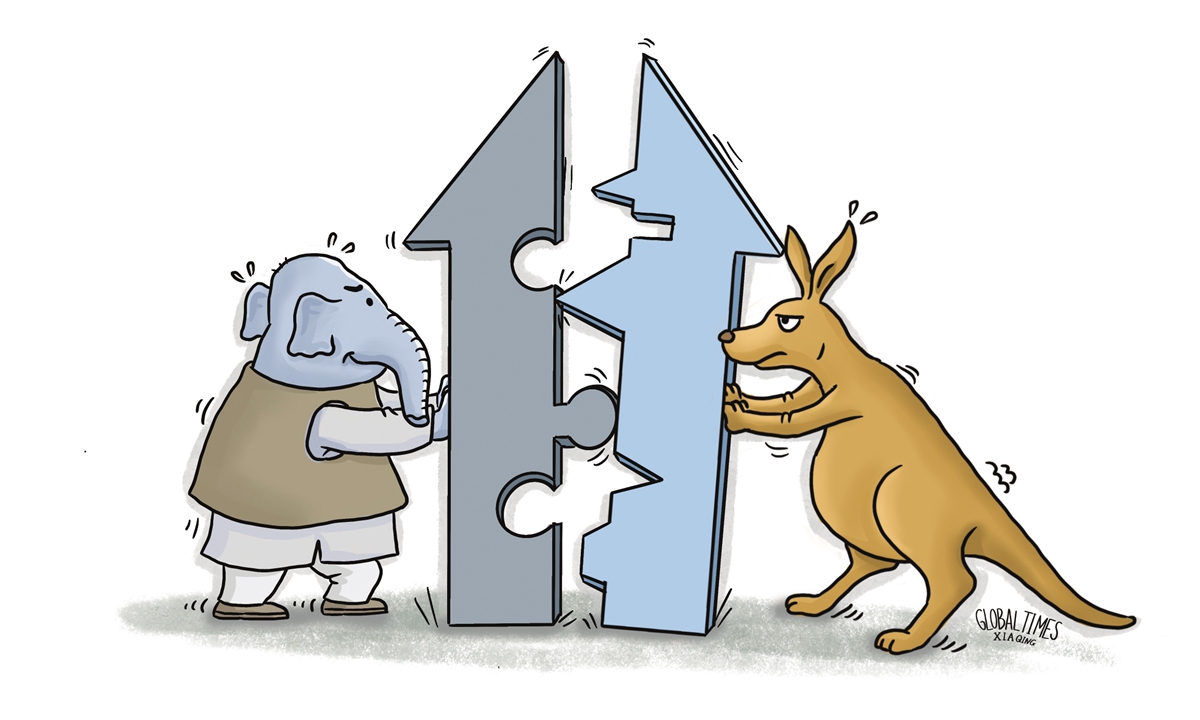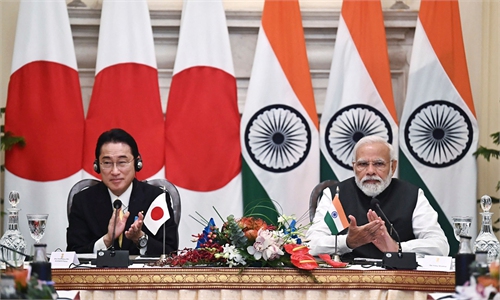No place for Europe-style conflict in Indo-Pacific

India-Australia FTA talks shouldn't be led by anti-China paranoia. Illustration:Tang Tengfei/GT
Australian Prime Minister Scott Morrison on Monday "expressed his understanding of India's position on the crisis in Ukraine," some Indian media outlets cited India's Foreign Secretary Harsh Vardhan Shringla as saying. This line came after Morrison and his Indian counterpart Narendra Modi concluded a virtual summit on the same day.
India's neutral stance toward the Ukraine crisis has triggered dissatisfaction from Washington and its allies. Washington tried to mobilize allies, like Tokyo, to try to persuade New Delhi, but did so unsuccessfully. This time, it was Morrison's turn. As Morrison has long been an "agent" of the US, his expression of "understanding" indicates that allies in the US orbit have given up lobbying India over the Ukraine crisis. They do not want to see India's stance on this issue affect their cooperation in containing China.
Modi and Morrison reportedly agreed that the conflict in Europe should not take the focus away from the Indo-Pacific. Morrison said on Monday, "Our meeting today is set against the very distressing backdrop of the war in Europe which must never happen in our own region." Despite such rhetoric, Canberra has still followed the US' lead to undermine the peace and stability in the Indo-Pacific region.
Furthermore, Morrison's notion conveys a sinister geopolitical intention. The US, and its allies like Australia, still wants to contain China, but the Ukraine crisis has distracted their attention. Morrison hopes that the US will not reduce its investment in the Asia-Pacific region because of the crisis.
The US and its allies haven't learned their lesson from the Ukraine crisis. The crisis is a consequence of the US and some of its allies pushing a major country like Russia into a corner. Has the US considered the consequences if it were to similarly push China into a corner in the Indo-Pacific region?
The Ukraine crisis should be an opportunity for India to reflect on the pro-US diplomacy it has followed in recent years. Getting closer with the US and joining Quad comes with a price - damage to its strategic autonomy.
India still sees China as its main "threat" and wants to contain China with the help of the US, Japan and Australia. Even though the Ukraine crisis won't severely affect the Quad, it will influence the scope and depth of the bloc's cooperation. Actually, it has tested how much India would like to cooperate with the US over issues of the latter's core concerns. If and when necessary, India would insist on its own principles. India's participation in the Quad is to safeguard its own national interests. If the bloc or the US wants India to do something that might jeopardize its national interests, India will surely resist.
All in all, the prospects for the Quad are slim. The US is attempting to shape the group into an Indo-Pacific version of NATO against China. NATO has already encountered severe challenges in Europe; attempts to create an Indo-Pacific version will certainly fail as well.
India is reluctant to see Quad become an Indo-Pacific version of NATO, as it doesn't want to become a victim of confrontation between different blocs. New Delhi believes that it is in its best interest to maintain a balanced posture on the global stage.
In addition, unlike Europe, countries in the Indo-Pacific appear to be more interdependent. China's ties with its neighbors are strong in terms of politics, economy and security. Regional countries have gradually grown accustomed to adopting a strategy that seeks development through regional cooperation. The geopolitical confrontation the US has created in Europe does not have a place in the Indo-Pacific.
The author is head of the Department for Asia-Pacific Studies at China Institute of International Studies. opinion@globaltimes.com.cn

